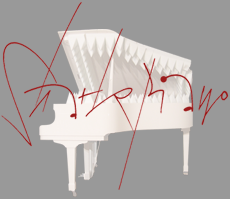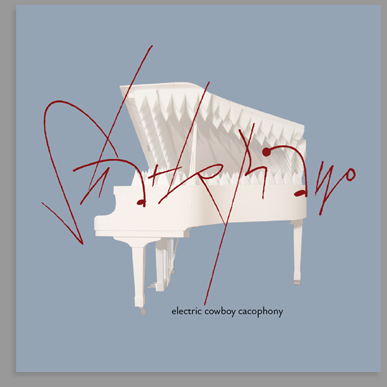

Discs available now from
sumtone
and
sound323
Also available for download
from iTunes and in the
US from
Rhapsody and
Amazon
For more, see bonus sounds below.
There are also some MP3s of the discussions that took place while recording in Marseille in July 2008.
For those of you who read Dutch there's a review of the album on page 14 of JazzFlits no. 123 (7th September 2009).
An Italian review is available at
AllAboutJazz.

Included in this release is both a standard audio CD and a DVD-Audio (DVD-A) disc. The DVD-A format is not the same as the more common DVD Video disc and not all DVD players are able to read it. The audio format on this disc is uncompressed linear PCM at 48KHz, 24bit. The surround format is 5.0: front left, front right, centre, rear left, and rear right. As this is a music DVD, the Low Frequency Effects channel (the LFE, i.e. the “point one” in 5.1) found on DVD-Video discs is not present here. It is assumed that your playback system consists of five full frequency range speakers with or without a subwoofer and/or bass management. The project was conceived for the surround sound format of DVD-A and the 5.0 mix was created first. The stereo CD mix was created separately, i.e. it is not just a simple surround to stereo mixdown. Although by no means of inferior quality, this will not re-create the spatial effects of the DVD-A mix, in particular of the live computer sound processing.
The DVD-Audio is divided into two programme groups, somewhat like the old A and B sides of a record. All tracks were single takes with no overdubbing and no cuts. Fade ins and outs were used at the beginning and end of each number only to remove the usual musician preparation and exit noises.
“Böse”, in German, means angry, nasty, evil—even vicious. This was from our first session. It shows Karin in fighting form with the rest of us forced to take up arms against the might of her bass and high treble clusters, her hammering. A real “getting-to-know-you”.
This track demonstrates what became a favourite approach of ours, with one of us—this time me on saxophone—setting a mood through an often extended solo, the others entering at will. Sometimes (e.g. karibo, shark guitar) the entries were quite inconspicuous; at other times, as here, they were almost interruptive. I love Jean-Marc’s strong and challenging interjection on this track, prepared by an inviting strum from Paul.
“Zank”, in German, means quarrel (is there a theme developing here?). This improvisation arose after a bit of name calling when technical problems forced us to abandon the previous attempt. Amongst other things it offers some nice examples of wind-controller triggered live sampling, especially towards the end.
Paul’s bluegrass roots come through strongly on this track. They’re nicely paired and counterpointed by Karin’s high-speed upper-octave dexterity to create an opening duo which gave Jean-Marc and I something to reach for. It’s a bit of a bone-rattler, with more than a hint of tradition.
Karin and Jean-Marc in acoustic duo. Lots of extremely delicate sounds both inside the piano and on the keys/strings/frets, with and without ebows. Jean-Marc develops something almost folk-like by the end but Karin pushes that contemporary edge with piano string scrapes and other assorted noises.
An extended ebow and keyboard solo from Karin sets a delicate, almost private mood that wasn’t easy to intrude upon.
Another example of one player electing to set the character of the improvisation by beginning alone. No solo here though. As soon as I heard Paul’s beginning I had to join straight in, so the result was completely different to karibo. We don’t discuss the mood in advance, but this is the most bluegrass of them all.
Something about the pacing, pausing, and rather strict sound world of this improvisation reminded me of the German composer Helmut Lachenmann. But the title is meant more as an homage than as a claim to be able to do or even outdo in real-time the intricate compositional forms of the great man himself.
Another one begun by Karin, this time pushing a small cymbal down the piano strings and eventually being picked up by my granular synthesis, looping, and real-time sampling. Paul’s spacious plucked entry leads into a very gentle but somehow quietly threatening part by Jean-Marc that in time opens full throttle into some deliciously deranged distortions (a killer from the deep).
I’m not sure whether we’re in Kansas (where Paul grew up) or Texas (Paris). This one begins with Paul and Jean-Marc in plucked and bowed string duo. The wind-controller triggered live sampling eventually regurgitates and retunes Paul’s bowed banjo sounds, throwing them back into the texture with a strange temperament of an octave and a fifth divided into 12 equal steps (almost a Bohlen-Pierce scale).
The following three numbers didn't quite make it onto the recording but
nevertheless got very far in the mixing process. They're offered here
in their entirety for free:
![]() paul goes spanish
paul goes spanish
![]() sclick
sclick
![]() wobble
wobble
We recorded some of the discussions that took place during the recording
sessions. These provide some insight into the approach of the individual
players in the group as well as to the recording as a whole.
![]() Jean Marc on the
necessity of individual freedom.
Jean Marc on the
necessity of individual freedom.
![]() Karin on her
mood-based approach to improvisation.
Karin on her
mood-based approach to improvisation.
![]() Paul on acoustic
integrity in the context of live electronics.
Paul on acoustic
integrity in the context of live electronics.
![]() Michael on the
role of the computer in his improvisations.
Michael on the
role of the computer in his improvisations.
![]() Paul on the
importance of having time to develop enough material.
Paul on the
importance of having time to develop enough material.
![]() Jean-Marc on the
different ways to create musical form when making free improvisation
recordings.
Jean-Marc on the
different ways to create musical form when making free improvisation
recordings.